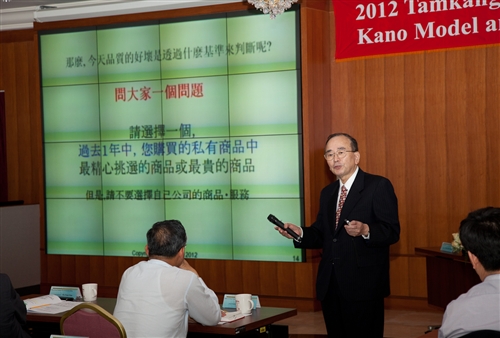A Lecture from a Quality Management Master
2012/05/17
Google+!

FENG, WEN-HSING
On Thurs, 17th May, an internationally-renowned expert in the field of quality management delivered a lecture at Tamkang’s Tamsui Campus. The guest speaker, Noriaki Kano, is a Japanese professor – now retired – who has published numerous academic papers (over 300) relating to quality management; many seminal QM books and textbooks; and received countless international awards, including the Quality Control Literature Prize (six times), the Deming Lecturer Award (1997), and the E. Jack Lancaster Medal (2002).
Prof. Kano’s lecture took the theme “Kano Model and Attractive Quality Creation”. During the lecture, which Kano delivered in his unique humorous style, he extrapolated on his own model of quality creation. He explained that the process of “dealing with quality” had undergone three separate evolutionary phases: from “Quality Control” in the 50s and “Quality Management” in the 70s, to the more proactive policy of “Quality Creation” seen today. Prof. Kano divided “quality “into four distinct elements: indifferent quality, attractive quality, one-dimensional quality, and must-be quality.
He gave an example of the four types of quality, citing people’s attitudes to color television in the early 1980s. According to Kano, the energy consumption of color television belongs to one-dimensional quality: when it is ideal, people are very satisfied; when less than ideal, people become easily dissatisfied. The safety of a television set is “must-be quality”, in that a high level of safety is viewed as a given or a must. The remote control represents “attractive quality”– a high quality remote control makes the user very satisfied; while stereo sound was an “indifferent quality”, as users at the time generally did not care whether the sound was stereo or mono.
Kano offered another example, pointing to a male-female relationship between a couple known as John and Mary. As children, John and Mary would play together and have fun, but had no special feelings toward each other (indifferent quality). Then, at around the age of 17 or 18, they suddenly started to see each other differently, and a deep attraction developed (attraction quality). They eventually got married. When Mary was around to keep John company or do the house work, John felt blessed. However, when Mary was not around or did not want to clean up the house, John got unhappy (one-dimension quality). As time went by and John got used to Mary’s presence, he began to take her for granted. Now, no matter how hard Mary works to clean up the house, John no longer sees it as something special (must-be quality).
The lecture, which was attended by the President of TKU, Dr. Flora Chia-I Chang, and all senior TKU faculty and staff, taught attendees to strive for quality creation and to always exceed the expectations of one’s customers and managers.
Viewers: 10150